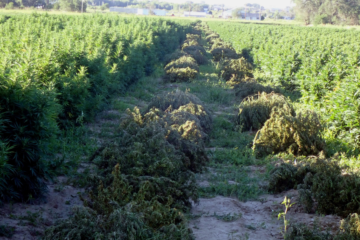State and local officials in Tennessee have agreed to pay $735,000 to settle a lawsuit brought by two businesses alleging the wrongful seizure of 231 pounds of legal hemp. The lawsuit stemmed from a controversial incident in May involving local law enforcement and the district attorney’s office.
A Costly Misunderstanding
In May, Spring Hill police confiscated hemp products from two businesses—Old School Vapor and SAK Wholesale in Columbia, Tennessee. The seizure, which included goods valued at $1.35 million, sparked immediate legal action.
The businesses filed a federal lawsuit, naming Spring Hill Police Chief Don Brit, 11 officers, and District Attorney Brent Cooper as defendants. Central to the case was a statement attributed to Cooper, who allegedly equated legal hemp with marijuana, calling it “the same damn thing.”
Under federal and Tennessee law, hemp is distinct from marijuana based on the concentration of delta-9 THC, the compound responsible for marijuana’s psychoactive effects. Products with less than 0.3% delta-9 THC are considered legal, while those exceeding that threshold are classified as marijuana.
The settlement comes amid growing scrutiny over the handling of hemp-related cases, underscoring the fine line between legal and illegal cannabis products.

Legal Definitions and Real-World Challenges
Hemp’s legality hinges on its chemical composition, but its appearance can make enforcement tricky. Visually, hemp flowers and marijuana are nearly indistinguishable. Determining their legality often requires lab testing, a step that wasn’t initially taken in this case.
The seizure highlighted the ongoing tension between hemp businesses and law enforcement over misunderstandings and enforcement inconsistencies.
- Legal Threshold: Hemp products must contain less than 0.3% delta-9 THC.
- Testing Requirements: Lab analysis is typically required to confirm compliance.
- Appearance: Hemp and marijuana flowers look nearly identical to the naked eye.
For the affected businesses, the financial and reputational damage prompted swift legal action, culminating in the hefty settlement.
Temporary Halt on New Hemp Rules
The settlement isn’t the only hemp-related legal battle in Tennessee. Industry groups have also challenged new state regulations that could reshape the market.
Initially set to take effect on December 26, the rules would introduce testing for THCA, a naturally occurring acid in hemp plants. THCA converts to THC when exposed to heat, raising concerns among hemp producers.
On Monday, a Nashville judge issued a temporary injunction, delaying the rules until at least February 18. The decision gives the industry more time to push back against what many see as overly restrictive measures.
Implications of the Proposed Rules:
- New Testing Standards: Products would be tested for THCA for the first time.
- Market Impact: Many existing products could be deemed non-compliant.
- Legal Concerns: The industry argues the rules amount to a de facto ban on hemp.
For now, hemp businesses in Tennessee are operating in a legal gray area, with significant financial and regulatory challenges looming.
Broader Context for Hemp Industry
Tennessee’s hemp industry is part of a nationwide market that has grown since the 2018 Farm Bill legalized hemp federally. However, inconsistent enforcement and varying state laws have created hurdles for businesses.
The settlement and ongoing legal disputes highlight the need for clearer regulations and better education for law enforcement. Without such measures, incidents like the Spring Hill seizure could become more common, putting businesses at risk.
For Tennessee, these cases are a reminder of the complex dynamics at play in regulating a burgeoning industry while ensuring compliance with federal and state laws.




